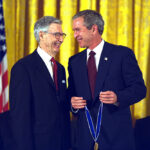While the concept of Presidents That Served Non Consecutive Terms like Grover Cleveland offers a unique chapter in American political history, the narrative of consecutive presidencies also holds significant stories of leadership and transformation. Woodrow Wilson, the 28th U.S. President, served two consecutive terms (1913-1921) and left an indelible mark on both domestic policy and international relations. His presidency is characterized by progressive reforms at home and a transformative, albeit ultimately unsuccessful, vision for global peace.
From Academia to the White House
Born in Staunton, Virginia, in 1856, Thomas Woodrow Wilson’s early life and career were deeply rooted in academia. He pursued higher education with vigor, earning an undergraduate degree from Princeton University (then the College of New Jersey), a law degree from the University of Virginia, and a Ph.D. in political science from Johns Hopkins University – a distinction that makes him the only U.S. President to hold a doctorate.
Wilson’s passion for political science led him to a successful career as a professor. He taught at various institutions before returning to Princeton, where his scholarly work garnered respect, culminating in his appointment as university president in 1902. This role provided him with administrative experience and a platform to advocate for educational reform.
His foray into politics began in 1910 when he was elected Governor of New Jersey. Running as a Democrat on a progressive platform, Wilson quickly gained national attention. His reformist agenda and intellectual prowess positioned him as a compelling presidential candidate, securing the Democratic nomination in 1912.
The New Freedom and Domestic Achievements
Wilson’s presidential campaign centered around the “New Freedom” platform, emphasizing states’ rights, individualism, and limited government intervention in the economy. Despite the rhetoric of limited government, his first term saw significant federal action aimed at regulating key sectors and promoting social welfare.
Three landmark pieces of legislation defined his initial domestic agenda:
- The Underwood Act: This act significantly lowered tariffs, a long-sought goal of reformers who believed high tariffs benefited special interests at the expense of consumers. To compensate for lost revenue, the act also established a progressive federal income tax, a major shift in American fiscal policy.
- The Federal Reserve Act: Recognizing the need for a more stable and flexible monetary system, Wilson championed the Federal Reserve Act. This created a network of twelve regional Federal Reserve Banks, overseen by a central board, to regulate the nation’s money supply and provide financial stability. This act remains one of the most consequential pieces of economic legislation in U.S. history.
- The Federal Trade Commission (FTC) Act: To address concerns about unfair business practices and monopolies, the FTC was established. This agency was empowered to investigate and prevent anti-competitive behavior, marking a significant expansion of federal regulatory power over the economy.
Beyond these key acts, Wilson also championed labor reforms. He signed legislation prohibiting child labor, aiming to protect children from exploitative working conditions, and he supported the Adamson Act, which established an eight-hour workday for railroad workers, a major victory for the labor movement.
World War I and the League of Nations
While Wilson pursued domestic reforms, the shadow of World War I loomed over his presidency. Initially, Wilson maintained a policy of neutrality as Europe plunged into war in 1914. He won re-election in 1916 on a platform of “He Kept Us Out of War.”
However, German submarine warfare, including attacks on American vessels, gradually shifted public opinion and Wilson’s stance. In 1917, he asked Congress to declare war on Germany, arguing that the U.S. must fight to “make the world safe for democracy.”
American entry into World War I proved decisive. U.S. forces contributed significantly to the Allied victory. Following the armistice in 1918, Wilson became a leading voice for a lasting peace. He articulated his vision in his Fourteen Points speech, proposing principles for international relations, including open diplomacy, free trade, national self-determination, and, most importantly, the establishment of a League of Nations.
The League of Nations, Wilson believed, would be an international organization to prevent future wars by providing a forum for diplomacy and collective security. He traveled to Paris to participate in the peace negotiations and tirelessly advocated for the League’s inclusion in the Treaty of Versailles.
Despite his efforts and the award of the 1919 Nobel Peace Prize, Wilson faced significant opposition to the Treaty and the League in the U.S. Senate. Isolationist sentiment and concerns about national sovereignty led the Senate to reject the Treaty of Versailles, and the United States never joined the League of Nations. This was a profound disappointment for Wilson and a major setback for his vision of a new world order.
Legacy and Final Years
The fight for the League of Nations took a heavy toll on Wilson’s health. In 1919, he suffered a debilitating stroke while on a national tour to promote the League. He never fully recovered and his second term was significantly hampered by his ill health. He left office in 1921 and retired to Washington, D.C., where he died in 1924.
Woodrow Wilson’s presidency remains a complex and debated period in American history. He is remembered for his progressive domestic reforms, his leadership during World War I, and his ambitious, though ultimately unsuccessful, attempt to create a League of Nations. While not a president who served non-consecutive terms, his two consecutive terms were nonetheless transformative, shaping the role of the federal government in American life and America’s place in the world.

